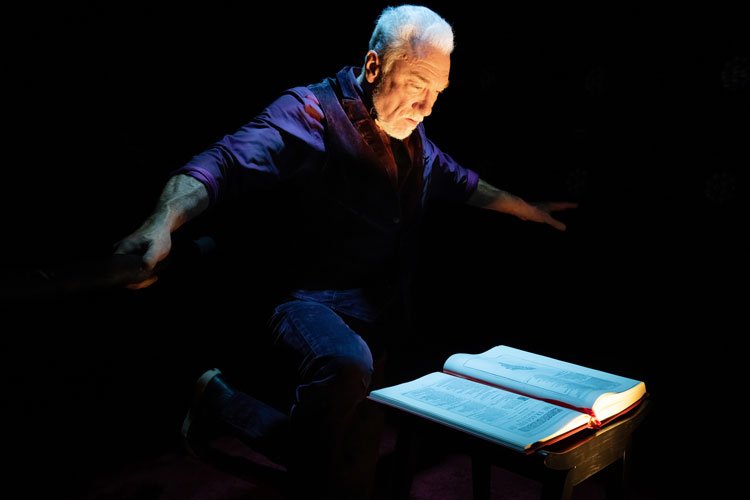I’ve always loved live theater, and in the past couple of years I’ve been making a stronger effort to see more of it. Theater Thursday is a new occasionally series where I talk about live theater, both shows I’ve seen recently and shows I’ve loved in the past.
production photo by JULIETA CERVANTES
“Hell is empty … and all the devils are here,” Patrick Page intones, tapping his chest portentously, in the Instagram ads for his one-man show tracing the history of Shakespeare’s villains. Those two lines, delivered in Page’s basso profundo growl, should be enough to get you to the DR2 Theatre in New York City before All the Devils Are Here closes on March 31st. But if the ad alone, or Page’s multiple social media appearances and online interviews about the show, haven’t convinced you, I hope this review will. Especially if you’re an actor, or a writer interested in exploring the characterizational depths of villains, or “just” a reader or theatergoer who loves Shakespeare.
I’m not the first to describe All the Devils Are Here as a Master Class in Shakespeare, and I’m sure I won’t be the last – but that’s exactly how I felt after the seeing a performance back in December (yes, I’m slow on posting reviews. If you read the blog regularly, this does not surprise you), and doubly-so since the performance I attended was followed by a “talkback” with Page where the audience got to ask him questions about performing and interpreting Shakespeare. Page packs a ton of history, biography, soliloquies, dialogue (playing both roles in the conversation), and memoir into 90 minutes of stage time. I was breathless and exhausted (in all the best ways) by the end of the performance. Page’s energy was full-on and commanding throughout, even in the quietest moments and throughout the talkback.
The play is structured mostly chronologically, following the development of Shakespeare’s villains from the early, simple “maleficent” / “deal with the devil” type characters based on the plays the Bard would have seen as a child through the more complex characterizations of characters like Shylock of The Merchant of Venice and the sociopathic Iago of Othello. Page’s thesis is that our modern fascination with villains is all Shakespeare’s fault, as the playwright worked to create antagonists who were not just one-dimensionally evil but who had depth and nuance, who had reasons (or justifications, at the least) for every evil choice they make. Along the way, Page also charts Shakespeare’s own history and how it influenced the characters he wrote and the plots he crafted. I say the play is structed “mostly chronologically,” because Page very effectively uses Macbeth to bookend the performance, opening with Lady Macbeth’s “unsex me now” speech and eventually delivering Macbeth’s “is this a dagger I see before me” soliloquy when the play turns up in true chronological order. I loved this, as Macbeth is my favorite Shakespeare play. (Like Page, I seem to gravitate to the Shakespeare plays that feature strong villains – Macbeth, Othello, Richard III.)
In between soliloquys and two-character scenes, Page’s tone turns conversational. Yes, this is a one-man show, but Page invites the audience to be a part of it by talking to us as though we were at a meet-and-greet or dinner with him instead of sitting on the other side of the footlights. Of course, this conversational tone turns into a true conversation during the post-performance talkbacks. I do not recall every question that was asked, and I’m still a little bummed that I could not think of a question I considered good enough to ask, but his response to one question has stayed with me. I’m paraphrasing, but the question was something along the lines of “how do you prepare for playing a clearly villainous role?” Page’s response focused on understanding that the villain doesn’t usually think of themselves as a villain, so the actor must figure out what it is the character wants, and he used Macbeth as an example: what Macbeth most wants is to conquer his fears: fear of the witches, fear of killing Duncan, fear of losing the power he has gained, fear of death. Page talked for several minutes about what Macbeth wants and how that leads to his ultimate end, and it gave me new insight into one of my favorite literary characters (and a role I’d love to play some day if I’m ever in a position to act again).
Page also makes effective use throughout the show of simple costume changes (the donning and doffing of a jacket, the addition of a pair of reading glasses) and a small handful of props (a staff, a goblet, an oversized leather-bound volume of Shakespeare’s works) to supplement his performance, and full credit must also be given to lighting designer Stacey Derosier and sound designer Darron L West for the way their work melds with Page’s onstage presence. It’s a shame Off-Broadway works aren’t eligible for Tony Awards, because the director, acting, and lighting and sound work are all the highest caliber. (Also, I’m not sure who decided on the pre-show playlist, but full marks on an incredibly eclectic mix of songs that feature the Devil or devils in general.)
I’m posting this on Thursday, March 7th, which gives you still a solid three weeks to catch Patrick Page’s bravura, moving, entertaining and educational show. Never mind “hie thee to a nunnery,” hie thee to the DR2 Theater!
